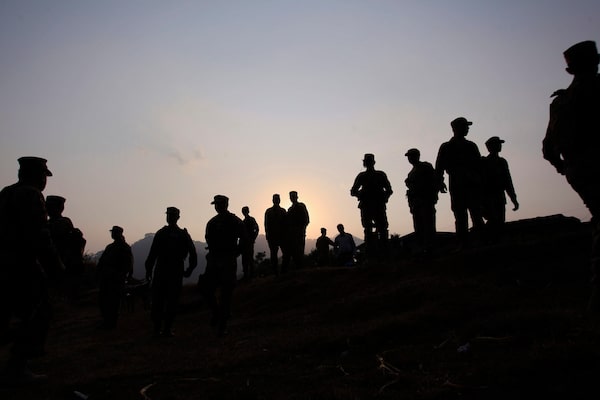
Pakistani soldiers gather at a forward area post on the Line of Control, that divides Kashmir between Pakistan and India, in Tatta Pani, on Oct. 1, 2016.Anjum Naveed/The Associated Press
Pakistan and India pledged Thursday to halt cross-border firing in the disputed region of Kashmir, promising to adhere to a 2003 accord that has been largely ignored, officials from both sides said.
If implemented, the move would be a major step in defusing tensions in the highly militarized Himalayan region, which is divided between India and Pakistan and claimed by both in its entirety, and opens the possibility of a broader detente between the two nuclear-armed rivals.
Artillery, rockets and small arms fire have been regularly exchanged between troops on opposite sides of the border, killing hundreds since the original ceasefire was signed. Civilians are caught in the crossfire whenever violence erupts, with dozens killed every year.
The two sides’ militaries have now made vocal commitments, with senior generals reaching an understanding over a hotline on Wednesday, a joint statement said.
“Both sides agreed for strict observance of all agreements, understandings and cease firing” along the frontier, it said. “Existing mechanisms of hotline contact and border flag meetings will be utilized to resolve any unforeseen situation or misunderstanding.”
In India, Lt. Gen. D.S. Hooda, who was head of the Indian military’s Northern Command from 2014 to 2016, welcomed the move, calling it “a significant, positive development given there has been steep escalation in the border skirmishes in last few years.”
In Pakistan, retired army Gen. Talat Masood said he believed leaders in Washington and other world powers had helped reduce tension between Pakistan and India, adding that peace was in both counties’ best interests.
It was unclear what prompted the two militaries to initiate contact over the hotline, but Pakistan has been urging the international community to push India to resume dialogue.
Pakistani authorities say India has made more than 13,000 violations of the ceasefire in the past 18 years. India also alleges large-scale violations by the Pakistan army.
Since gaining independence from British rule in 1947, Pakistan and India have fought two of their three wars over control of Kashmir.
Relations were strained in 2019, when Pakistan shot down an Indian warplane in Kashmir and captured a pilot in response to an air strike by Indian aircraft targeting militants inside Pakistan. India at the time said the air strikes targeted Pakistan-based militants responsible for a suicide bombing that killed 40 Indian troops in the Indian-controlled part of Kashmir. Pakistan said there was no militant camp and the Indian planes dropped bombs in a forest.
Since then, a peace process between Islamabad and New Delhi has been on hold.
Pakistan also wants India to reverse a 2019 move under which New Delhi stripped the Kashmir’s semi-autonomous status and imposed a slew of administrative changes through new laws, touching off anger on both sides of the frontier.
India accuses Pakistan of arming and training anti-India rebels and also helping them by providing gunfire as cover for incursions into the Indian side. Pakistan denies this, saying it offers only moral and diplomatic support to Kashmiris who oppose Indian rule.
Rebels in Indian-administered Kashmir have been fighting Indian rule since 1989. Nearly 70,000 people have been killed in the armed uprising and the ensuing Indian military crackdown.
Our Morning Update and Evening Update newsletters are written by Globe editors, giving you a concise summary of the day’s most important headlines. Sign up today.